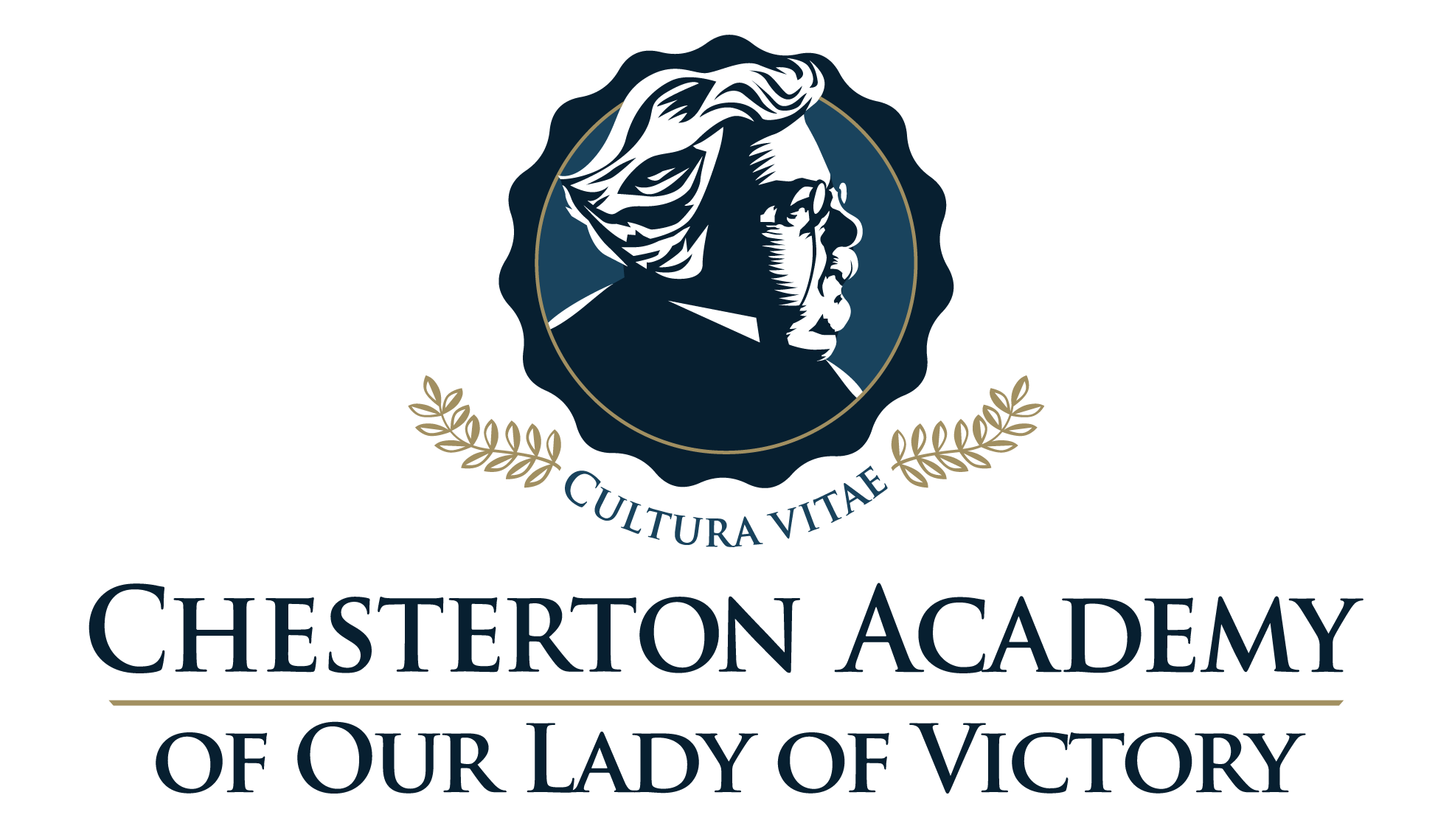The Fine Arts Program
Music
“A song is a thing of joy; more profoundly, it is a thing of love.”
Saint Augustine
At Our Lady of Victory, students are exposed to a wide variety of music and perform chorally several times a year. An OLV education includes music theory, performance, ear training, note reading, and musical analysis. Music history is taught chronologically with an emphasis on music development within the Church, and corresponds to the historical period in which the students are immersed. Students perform in at least three concerts a year: an Advent concert, the spring Fine Arts Night and the Baccalaureate Mass. Some representative sacred works that the OLV choir has performed are Jacques Arcadelt’s “Ave Maria”, Pitoni’s “Cantate Domino”, and the great O Antiphons in Gregorian chant. The OLV choir also performs spirituals, jazz pieces, ballads, and modern classics.
The music program at OLV is distinctive in several ways. First, the program highlights the sacred music of the Church, particularly Gregorian chant. Second, through Formation Fridays and other cultural events, OLV’s curriculum incorporates outside performances to further expose students to a range of musical genres and styles. In recent years, OLV students have attended the Colorado Symphony and a Rossini opera. Finally, the OLV music program aims to enrich and engage with the surrounding culture by performing at local benefits and charities. OLV students also regularly cantor at parish masses, participate in community musicals and orchestras, and compete in vocal and instrumental competitions.
Art
Students at OLV take art all four years. An art education at OLV includes the development of the students’ creative nature and provides them with tools and technique to express their ideas. Moreover, it exposes the students to great art and teaches the analytical skills with which to judge a work of art. Finally, OLV’s art curriculum situates the artistic endeavor within man’s great mission to participate in God’s ongoing creative work.
Art History and studio art SEQUENCE
Grade 9: Ancient Art History | Drawing and Calligraphy
Grade 10: Late Roman and Early European Art History | Pastels and Colors
Grade 11: Late Gothic, Renaissance, and Baroque Art History | Oils
Grade 12: Classical, Romantic, and Modern Art History | Oils
In studio art, OLV students create 4-5 projects every year. They begin by building their foundational skills and studying the elements of art and principles of design. As freshmen, they focus on drawing and learn the art of observation through projects such as value drawing, portraits, and cityscapes to develop an eye for value and scale. Sophomores are introduced to calligraphy techniques and illuminate manuscripts. They create graphite icons in the Byzantine style and study human anatomy in order to draw a person to scale correctly. Juniors are introduced to color theory and oil painting techniques. The OLV art program culminates in a senior painting project - either a copy of a masterwork or an original work of art. These projects require focused time, attention, and discipline to execute and represent the culmination of a rigorous program in studio art. Senior projects are displayed at OLV’s annual Fine Arts Night.
Besides studio art, OLV’s curriculum also incorporates art history. Students follow the development of artistic expression over time and study great representative works from each historical period. As part of the Formation Friday program, students visit local art exhibits. Students also engage in art-making - such as carpentry, graphic design, architectural drawings, and watercolor landscapes - as part of Inspiro Week and on their own in the local community. Finally, students at OLV study John Paul II’s “Letter to Artists” and take seriously its exhortation to engage with man’s creative capacity.
drama
“The beauty of theater is that, when all is said and done, you are giving a gift of yourself to the audience. As a cast, you spend months creating something rich and beautiful and then are asked to leave it all on the stage as an offering of self for the edification of your audience.”
Mrs. Christina Ouyang, Drama Teacher
All students at OLV are required to take classes in theater and perform in one play per year as sophomores, juniors, and seniors. Rather than viewing the arts as merely passive entertainment, the OLV curriculum invites students to enter into the creative process. The focus of OLV’s theater program is on creating believable characters using natural methods to tell redemptive stories. In addition to studying acting techniques and learning to inhabit a role, OLV teaches students to analyze a script to understand the author’s vision and each character’s motivation. A good actor, in addition to mastering the craft of acting, must also be part literary critic, philosopher, and historian. Finally, the OLV theater program aims to help students develop the virtues of courage, perseverance, discipline, and collaboration.
performance SEQUENCE
Grade 10: Comedy
Grade 11: Drama
Grade 12: Shakespeare
Drama at OLV begins sophomore year when the students are introduced to the craft of acting and learn basic acting techniques. They study stage movement, character analysis, learn voice control and play theater games to practice their skills. The sophomores rehearse and perform a comedy, as their introduction to the dramatic arts. As juniors, students learn more advanced character development techniques and increase their facility with script analysis as they prepare to perform a drama, with universal themes. Finally, as seniors, students study, memorize, rehearse and perform a Shakespeare play as the culmination of their theater education.
Recent productions:
Our Town (by Thornton Wilder)
A Midsummer Night’s Dream (by William Shakespeare)
Little Women (by Matthew Buchanan)
The Moustache (by Davis Alianiello)
Peter/Wendy (by Jeremy Bloom)
The Rose of Treason (by James DeVita; based on the true story of Sophie Scholl and the White Rose movement)
MacBeth (by William Shakespeare)
It’s a Wonderful Life (adapted by Joe Landry)
The Attempted Murder of Peggy Sweetwater (by John Rustan and Frank Semerano)
Much Ado About Nothing (by William Shakespeare)










